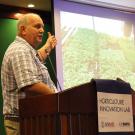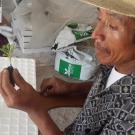This project brings together the technology and biological capital of the University of Wisconsin-Madison and the World Vegetable Center, based Taiwan, with the managerial and technical skills of three Central American institutions: CARE, El Salvador; Fundación Hondureña de Investigación Agrícola (FHIA) in collaboration with Fintrac, Honduras; and Universidad Nacional Agraria (UNA), Nicaragua.
During the project, advanced vegetable breeding lines provided by the World Vegetable Center are evaluated in on-farm field trials in collaboration with local community leaders for resistance to two of the most important production constraints in Central America, whitefly-transmitted begomoviruses (in tomato) and anthracnose (in pepper). Field days at each location with local growers, women’s groups, and community leaders provide updates and findings from the field trials, and cooperating organiztions also participated in a regional science-based workshop at the Panamerican Agricultural School, Zamorano, in Honduras. Regional leaders also gained hand-on experience in vegetable production and innovative marketing strategies through a workshop held at UW-Madison.


